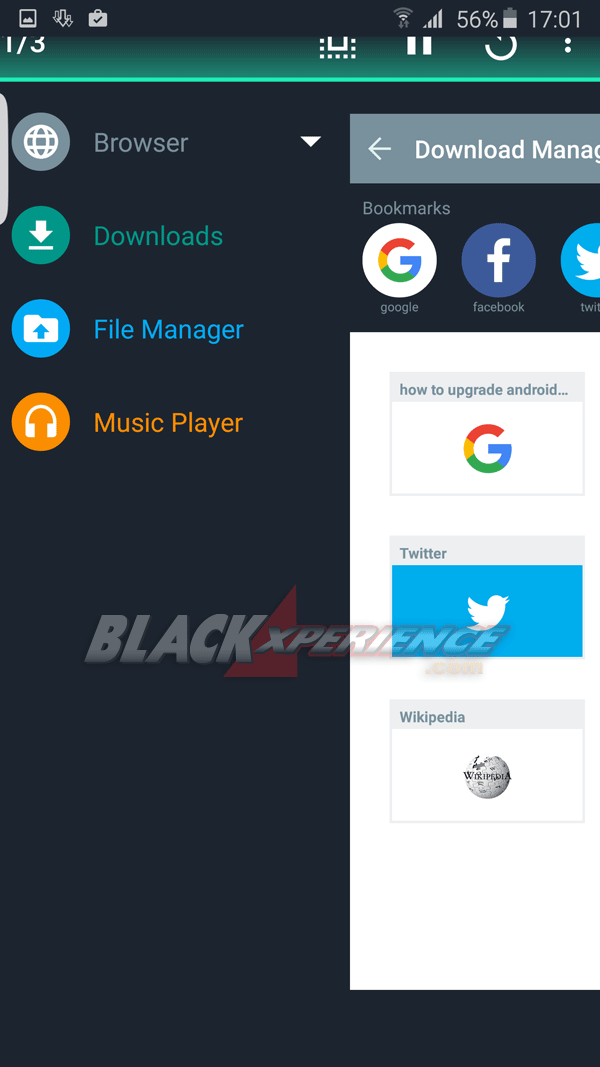Download manager is a program designed to ease the process of downloading files. It accelerates downloads by splitting files into multiple sections and downloading them simultaneously, and therefore speed up the download process. Additionally, it can also resume broken downloads so you don’t have to start downloading from the beginning. Although web browsers may have built-in download manager, but they do not speed things up the way download managers do.
There are numerous download manager apps available on Google play store that you can use to ease your downloading work. The following are some of the best free download manager apps for Android.
1. Advanced Download Manager
Advanced Download Manager is one of the powerful download manager app made for Android platform. This app lets you download files in three different parts and each part provides certain set download speed. You can easily choose the maximum download speed for each part.
Furthermore, if the data connection is lost during download, the program will resume it automatically when the connection is back.
ADM has a build in web browser with. If the download link isn’t a direct link, then this free app automatically opens its build in web browser to get the fresh link. It supports browsers like Stock Browser, Chorme, Dolphin, and Boat Browser.
All files will be saved according to types in different folder. You can even select the download links and add them to the app to download it later at any point of time.
Other Features of Advanced Download Manager:
- Accelerate download speed by using multithreading.
- Backup downloaded files on SD card.
- Widget on your home screen.
- Completion notification by sound and vibration.
2. LoaderDroid
Loader Droid is the second download our application, similar to the Advanced Download Manager, loaderDroid comes with faster download capabilities are also regularly being a mainstay if the default browser can not download certain file types.
features
There are many features that can be offered Loader Droid, but this is make it any practical and productive. LoaderDroid equipped with standard features such as pause and resume downloads, pause automatically when a connection is lost. In addition to these features, there are some special features that exist also in other download managers such as taking over downloads of the browser, set the download connection is different for each object downloads, splitting files downloaded into several parts to accelerate the download process.
This application also allows us to control our downloads to download the schedule adjustment feature, replacing dead link into a new one so the download will continue. LoaderDroid in-app browser is also quite telling to locate the file you want to download without having to open the browser itself. Download LoaderDroid here.
3. Premium Downloader
With Premium Downloader you can download files from several hosting that requires a premium account without the need to be a member of the hosting, such FileServe, Hotfile, Filesonic and various other premium hosting. Premium Downloader is also famous for the speed of the process of downloading that can allow you to download a file. Premium Downloader you can download for free from the Google Play Store which is located in www.play.google.com.
4. Internet Download Manager
After the success with the PC version, currently developed for the Internet Download Manager can be used on devices based on Android operating system. With Internet Download Manager, the download process you will be noticeably faster than usual. Internet Download Manager also supports a variety of file types and have a pause feature, so you do not need to download a file with a repeat from the beginning. Internet Download Manager can be downloaded for free from the Google Play Store which is located in www.play.google.com.
Source
http://www.blackxperience.com/bxcloserlookapps/detail/3-aplikasi-download-manager-terbaik-di-android
http://www.telkomsel.com/program/promo/9599-5-Download-Manager-Terbaik-untuk-Android
http://www.androidtipsz.com/5-best-free-download-manager-applications-for-android
Source
http://www.blackxperience.com/bxcloserlookapps/detail/3-aplikasi-download-manager-terbaik-di-android
http://www.telkomsel.com/program/promo/9599-5-Download-Manager-Terbaik-untuk-Android
http://www.androidtipsz.com/5-best-free-download-manager-applications-for-android


